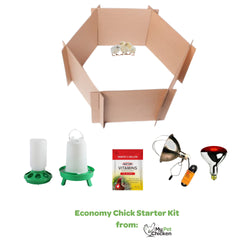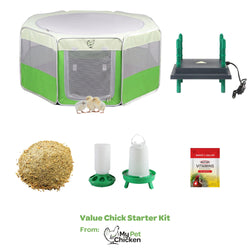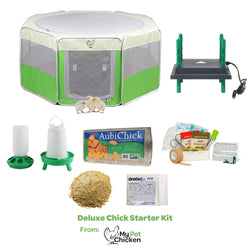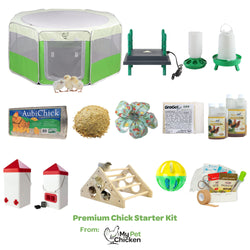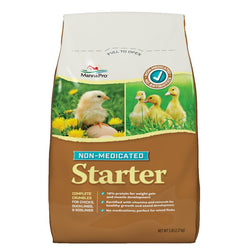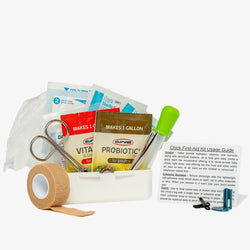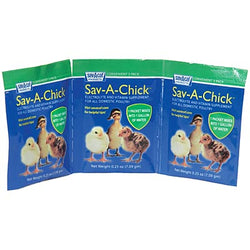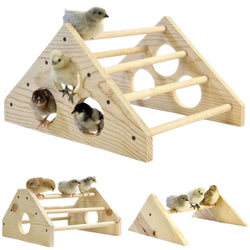What are the best ways to prevent impacted crop, impacted gizzard, and sour crop in my chickens?
Back to blog
Impacted crop occurs when there is a blockage in your chicken's digestive tract, preventing food from traversing her system.

Occasionally you may actually have a blockage further down, like an impacted gizzard. Sour crop---a bacterial overgrowth in her crop, typically an overgrowth of yeast---can occur when the digestive system is stalled with an impaction, but can also happen on its own if there's a pH imbalance, or if your chicken is eating rotten or moldy food.
There are a few good strategies you can use to prevent impacted crop and sour crop in your flock.
Pellets, mash, or crumbles---or organic chicken feed (or not), commercial or carefully balanced at home---your choice! But the bulk of her diet should be a good quality, nutritionally balanced food. Treats are lovely, mind you, but she should get most of her nutrition from a balanced feed.
That all should sort of go without saying, but here's another caution you may not have considered: Be especially sure not to provide cut grass unless it's finely chopped, because remember: chickens don't have teeth! They don't "chew" food until much further down the digestive system.
When your chicken is grazing on grass in the yard or pasture, she's nipping off small bits at a time. Those pass through her system just fine. But if you offer long strands of fibrous grass, they can wrap and twist around one another and tie themselves into a big knot in her crop, blocking her digestive tract. Normally the contents of her crop will then pass to her muscular gizzard, where the food will be ground up by grit or gravel she stores there. But if her crop gets blocked, the food'll never reach her gizzard!
That is clearly a problem, because your chicken can starve to death, unable to get any (or much) food to reach her stomach. But worse, the food contents stuck in her crop can begin to rot or ferment, leading to sour crop.
Sour crop often occurs as the result of an impaction, but can also occur on its own from a poor diet or imbalance. Crop contents bubble up; you may detect a sour or ripe smell coming from your chicken's beak. This can also cause problems with her digestion---and it's not the only bad thing that can come from your chicken consuming moldy food.
So they key takeaway here is that a good quality, fresh food can help to prevent impacted crop and sour crop.
Your chickens forage and pick up little rocks and gravel as they go about foraging. These reside in her muscular gizzard, where she uses them to grind up what she swallows. Once ground in the gizzard, the food progresses further down her digestive tract. If she has insufficient "grinders" in her crop, her digestion can slow, and impaction can happen in her crop or gizzard. And even beyond impaction, she'll just be able to extract more nutritional value from her food if she has plenty of good grit.
Your chickens WILL pick up gravel on their own if they have access to pasture, but you want to make sure there's plenty for everyone... and hard granite with rough edges is especially efficient. For that reason, to help prevent these digestive issues, make sure they have access to as much grit as they need. Provide a little dish, or scatter handfuls in the run every so often. The thing is, grit is inexpensive, and... it's ROCK, right? It's not like it goes bad or gets stale like food can. Grit is a worthwhile investment in your chickens' health.
Just as they can in humans, probiotics can help keep your birds' digestion healthy. In chickens, it can help inoculate good bacteria, so they can out-compete bad bacteria in their digestive system.
One thing you can do is provide probiotic yogurt to your chickens. Mix it up with a small amount of food---just enough for them to consume in an hour or two--and allow them to enjoy! Mind you, chickens---like all birds---are not geared to digest dairy products. But lactose breaks down in yogurt without those digestive enzymes needed, so it's generally considered safe for your chickens.
Another way to provide probiotics is through commercial poultry probiotic preparations like these designed just for your flock. Of course, be sure to follow mixing directions from the package carefully, as some preparations also contain electrolytes other things that you don't want to concentrate.

Occasionally you may actually have a blockage further down, like an impacted gizzard. Sour crop---a bacterial overgrowth in her crop, typically an overgrowth of yeast---can occur when the digestive system is stalled with an impaction, but can also happen on its own if there's a pH imbalance, or if your chicken is eating rotten or moldy food.
There are a few good strategies you can use to prevent impacted crop and sour crop in your flock.
Feeding
Feed fresh, good quality food.Pellets, mash, or crumbles---or organic chicken feed (or not), commercial or carefully balanced at home---your choice! But the bulk of her diet should be a good quality, nutritionally balanced food. Treats are lovely, mind you, but she should get most of her nutrition from a balanced feed.
That all should sort of go without saying, but here's another caution you may not have considered: Be especially sure not to provide cut grass unless it's finely chopped, because remember: chickens don't have teeth! They don't "chew" food until much further down the digestive system.
When your chicken is grazing on grass in the yard or pasture, she's nipping off small bits at a time. Those pass through her system just fine. But if you offer long strands of fibrous grass, they can wrap and twist around one another and tie themselves into a big knot in her crop, blocking her digestive tract. Normally the contents of her crop will then pass to her muscular gizzard, where the food will be ground up by grit or gravel she stores there. But if her crop gets blocked, the food'll never reach her gizzard!
That is clearly a problem, because your chicken can starve to death, unable to get any (or much) food to reach her stomach. But worse, the food contents stuck in her crop can begin to rot or ferment, leading to sour crop.
Sour crop often occurs as the result of an impaction, but can also occur on its own from a poor diet or imbalance. Crop contents bubble up; you may detect a sour or ripe smell coming from your chicken's beak. This can also cause problems with her digestion---and it's not the only bad thing that can come from your chicken consuming moldy food.
So they key takeaway here is that a good quality, fresh food can help to prevent impacted crop and sour crop.
Grit
Provide plenty of grit.Your chickens forage and pick up little rocks and gravel as they go about foraging. These reside in her muscular gizzard, where she uses them to grind up what she swallows. Once ground in the gizzard, the food progresses further down her digestive tract. If she has insufficient "grinders" in her crop, her digestion can slow, and impaction can happen in her crop or gizzard. And even beyond impaction, she'll just be able to extract more nutritional value from her food if she has plenty of good grit.
Your chickens WILL pick up gravel on their own if they have access to pasture, but you want to make sure there's plenty for everyone... and hard granite with rough edges is especially efficient. For that reason, to help prevent these digestive issues, make sure they have access to as much grit as they need. Provide a little dish, or scatter handfuls in the run every so often. The thing is, grit is inexpensive, and... it's ROCK, right? It's not like it goes bad or gets stale like food can. Grit is a worthwhile investment in your chickens' health.
Probiotics
Offer probiotics to keep digestion healthy.Just as they can in humans, probiotics can help keep your birds' digestion healthy. In chickens, it can help inoculate good bacteria, so they can out-compete bad bacteria in their digestive system.
One thing you can do is provide probiotic yogurt to your chickens. Mix it up with a small amount of food---just enough for them to consume in an hour or two--and allow them to enjoy! Mind you, chickens---like all birds---are not geared to digest dairy products. But lactose breaks down in yogurt without those digestive enzymes needed, so it's generally considered safe for your chickens.
Another way to provide probiotics is through commercial poultry probiotic preparations like these designed just for your flock. Of course, be sure to follow mixing directions from the package carefully, as some preparations also contain electrolytes other things that you don't want to concentrate.
Preventing impacted crop, impacted gizzard, and sour crop
So, to review: the best three ways to prevent impacted crop, impacted gizzard, and sour crop:- Feed fresh, good quality food
- Offer plenty of grit or gravel
- Provide probiotics
